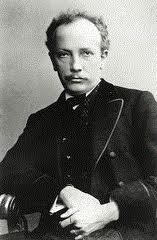Bridgewater Hall, Manchester, 23 January 2014
To celebrate the Richard Strauss anniversary – he was born 11 June 1864 – the Halle and BBC Philharmonic orchestras have come together to enable us to hear some of his less frequently performed works. The opening Festliches Praludium was a good case in point. Scored for a vast orchestra including almost 100 strings, the piece was a commission from the Emperor Franz Joseph, and certainly sounds like it. Grandiose to the point of pomposity and sheer triumphalism, it rattles along with hints of Brahms and Weber to keep listeners happy even as they cover their ears at the impact. As if the forces were not enough Strauss uses the full might of the organ and ends with a set of off-stage trumpets. All rather glorious if the forces are available but one would hardly go out of one’s way to hear it otherwise.
The heart of the evening was the performance of four orchestral songs. The first three were sung by Roderick Williams, to, thankfully, a normal sized orchestra. Notturno must be one of the most depressing, near suicidal, works ever composed. The textures are often close to Act 3 of Tristan and there is even a hint of Parsifal at the setting of der tiefen Wunde dunkles Mal. Thankfully Hymnus is more enthusiastic and hope comes at last with Pilgers Morgenlied. Throughout, Roderick Williams was able to carry heroically over the orchestra and bring subtlety to the text.
After the interval he was replaced by William Dazeley in the gothic nightmare Nachtlicker Gang. Here the orchestra is frequently so loud the singer’s voice is completely lost, though the printed text took us neatly through the horrors of the singer’s vision. Pitiless to the end, the climax is so insistent it was never quite convincing. Perhaps it was all too much of good thing and, in a different context, might have made a stronger impression.
No such problem with the final work, Ein Alpensinfonie, which dates from the same period as the songs. The lush writing and strong narrative effects were carried through with ease under the sure handling of Juanjo Mena. The hushed ending brought us safely back to earth after the heady risk of the mountain tops and the terror of the alpine storm.
The series continues with a wide range of events between now and March 2014, involving both orchestras and an impressive range of soloists. BH

